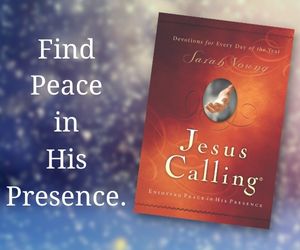Every Scar Has a Story: Mark Eaton & Kelsey Lamb
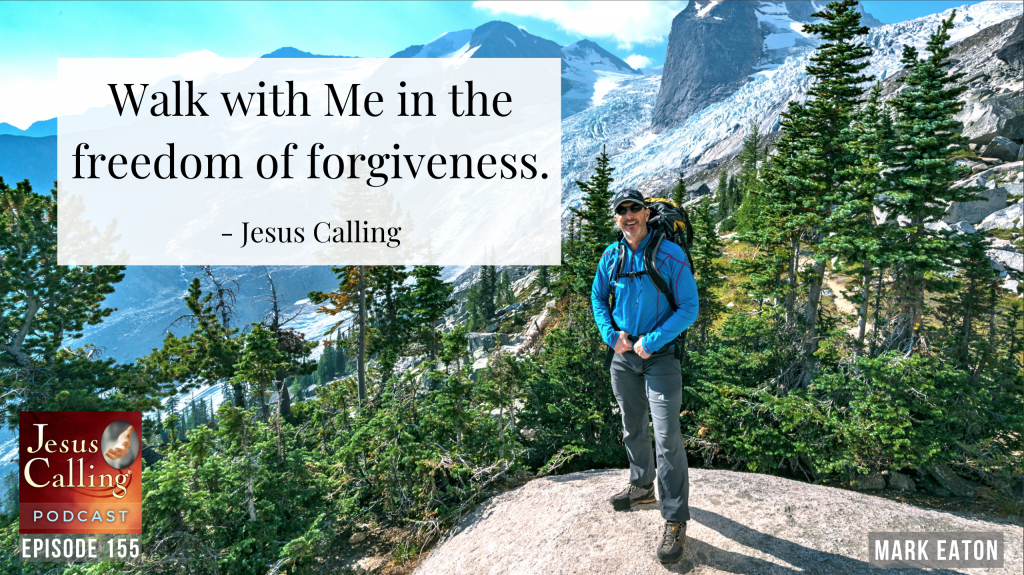
Mark Eaton: When I think of forgiveness, [I don’t think of it] as a one-time event, but as an ongoing posture of “live to forgive,” and not just repenting now, but repenting always.
When I see that little part of me [that says], “I want to take control,” I need to remember that I can control things sometimes, but I need to love people. I can fix things sometimes, but I need to love people, not fix things and fix people. I want to fix things and love people.
Every Scar Has a Story: Mark Eaton & Kelsey Lamb – Episode #155
Narrator: Welcome to the Jesus Calling Podcast. Today we talk with two guests from different walks of life who share their heartaches and scars with others so they can be encouraged to find their way: pastor and writer Mark Eaton, and country music singer/songwriter Kelsey Lamb.
First up, Mark Eaton has a 35-year history in nonprofit and ministry efforts, from directing a wilderness camping program for delinquent youth, to consulting and mentoring business leaders, to pioneering a regional men’s ministry in the northwest. Mark also tours with his wife, Susie McEntire Eaton, who has a thriving music ministry.
Mark’s road to ministry wasn’t easy. Growing up with a strict father shaped his view of God as a judge, and Mark never felt he measured up. Mark compensated by achieving in multiple areas, all in an attempt to receive the approval he craved. But there was always a hole in his life, one that needed to be filled by the love of a Father.
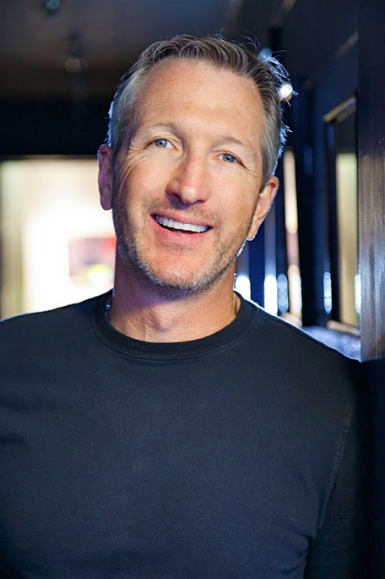
Mark: Hi, my name is Mark Eaton. I’m a Seattle native—actually, north of Seattle—in the great state of Washington. I moved to Oklahoma because I was lucky enough to marry Susie McEntire.
I was born in 1956 in the northwest corner of the northwest state of Washington, so right up by the Canadian border. My mom, strangely enough, was a North Carolina southern belle who had come to the state of Washington with her uncle, who was an evangelistic Southern Baptist preacher.
Dad was 6 foot 3 and came off the farm, and he knew all of the ranch and farm things that he grew up with, like so many did in those days. He went to World War II in the Coast Guard and was a pretty rough Northwest rivers/mountain/logging/fishing kind of guy. And here comes Anna Laura Sherrill from rural North Carolina.
It’s a great love story. They got married, and I was the firstborn boy. I have a little brother, and we were raised together in a pretty standard house with a mom and a dad. Although my dad traveled a lot for work, generally he was home until I was in sixth grade. And then he took a job that kept him gone for the [weekdays], and he’d be home on weekends.
I’d been in the middle of my dad’s career curve from fourth grade on. I was a new kid in school every year. I was small, and it was scary [because] there was there was a lot of bullying that was going on. I missed Dad more than I really was aware of.
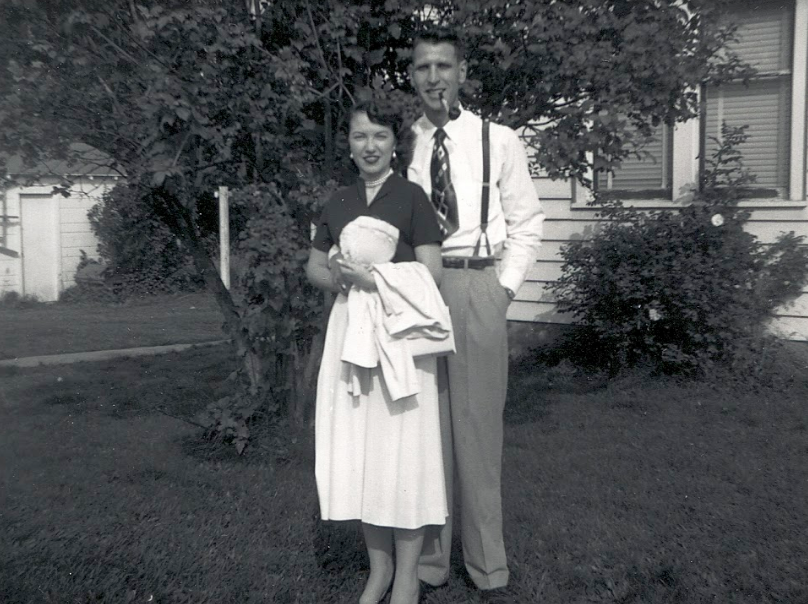
We went to church. I think that was a deal Mom and Dad made. He stopped smoking cigarettes, and he took up the pipe instead. I think that was a bit of [him] taking advantage of their agreement.
I never really felt like Dad was comfortable [at church]. My brother and I can both tell you stories of Dad clipping his fingernails in the middle of a church service, and I don’t know how conscious that was. He did a lot of drawing. He figured a lot of things out. He would have a problem to solve, so he’d have his Bible open and he’d make sketches and notes.
And then he would stand beside me with his hand on my shoulder during the endless, seemingly endless altar calls at the end. My brother walked the aisle. And a couple of weeks later, not to be outdone by my brother, I walked the aisle as well—to the extreme pleasure of my mother and all the women in the church. I somehow had the impression that life was going to get better the next day. Suddenly, magically, I’ll be transformed and that all my problems will go away—not that I had lots of problems as a 12-year-old. But [life is] hard for 12-year-olds.
“[When I became a Christian], I somehow had the impression that life was going to get better the next day.” – Mark Eaton
Trying to Measure Up to a Father’s Standards
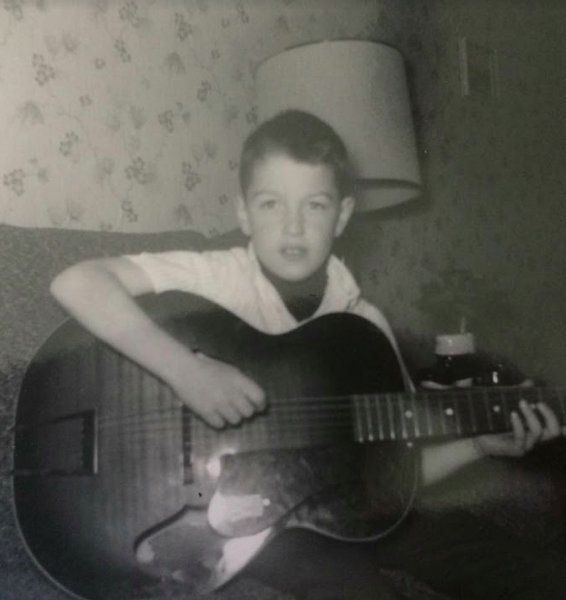
Reflecting on my dad, he didn’t come to my sporting events, and when he did he was distracted—he was talking with his friends.
I recall one time in Little League, I hit a homerun and bounced the ball off the car. They would park the cars [close to the field], and it made this “thud.” [The parents looked up], and there was me running around the bases.
My dad never came to my wrestling matches, any of them. I sort of held that against him, to a certain degree.
Part of my story I tell is that I was scared at home because my dad would over-discipline. I don’t think he was comfortable coming off the ranch and into the city life, where suits and ties ran the day, and college degrees. I don’t think he did really well at that. There was a lot of anger involved in that for him. He took that out on [me], his oldest son, several times.
I had this relationship where I kind of didn’t talk to Dad much because I couldn’t hoe the garden right, I had trouble mowing the yard right, and he was largely disappointed in my grades. Remember, we moved a lot. So my grades really struggled with new school districts. The result was that I ended up in the hospital with stomach ulcers at age 14. And that got my parents’ attention, but it also got the attention of my youth pastor, who came and called on me. I just felt like, I’ve walked the aisle, so all my problems should be done. I feel more guilt after coming to faith than I did before.
And [my youth pastor] was so kind. He taught me some verses to memorize, and I memorized those verses because I felt like they were gonna set me free. They had a profound effect on me, but I think [what impacted me more] was his intentional connecting with my life to his own. Not just on Sunday mornings at youth group, if you will, but his intentionally looking for me and saying, “You’re okay.”
I think I met the Lord when I was 14 because of a church that cared enough to, before they could probably really afford him, bring a youth pastor [named] Dave Grant onto their staff.
He’s one of many people who saved my life.
“I met the Lord when I was 14 because of a church that cared enough to . . . bring a youth pastor onto their staff.” – Mark Eaton
Looking for Affirmation in All the Wrong Places
I ended up leaving home at about my 16th birthday for very good reasons.
It was a perfect remedy for me. I was approached by some folks as a sophomore about being the all-American exchange student. [They said], “We’d like you to represent our school. Have you ever thought about going to Japan in this mutual exchange? Your host brother will come to this school, and you will go to his school. You’ll live in each other’s families.”
So I went to Japan for a year as a high school student. I could pick up language real quick, and I studied Judo for the entire year.
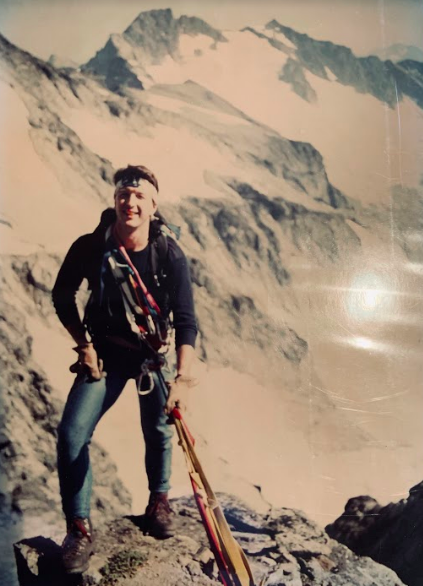
I came home from Japan and my folks had moved again, believe it or not.
But the world was my oyster, and I stepped into that [new American] school, and I just knew these kids were going to love me. I tried out for the football team—I’d never played football before, but I had gotten some size on me then at that point. Played football, started lifting weights, tried out for the baseball team. Through all of that, I was a popular kid and won, I think, a “Mr. Personality” award, having just arrived at this school. So all of my tools that I had gained really paid off.
They turned out to be the things that would be my undoing later.
I had learned to compensate for being afraid, to compensate for feeling small—these skills were mitigating the pain of that. I could be athletic, and I didn’t feel small anymore. I could be popular, so I felt included. All of those addictions and compulsions really got reinforced.
You don’t see them as addictions and compulsions when you’re young. And what was a tool became an addiction and later became a compulsion. I have to be popular. I have to be liked. I have to be athletic or seen as heroic. I have to be seen as confident.
“What was a tool became an addiction and later became a compulsion. I have to be popular. I have to be liked. . . . And there’s a point when those tools fail.” – Mark Eaton
It’s embarrassing. It really is embarrassing for me to say, but it was there, and there’s a point when those tools fail.
Forgiveness and Reconciliation Between Father & Son
I went off to Bible school and traveled from to literally the other side of the nation to go to Bible school. A couple of years later I got married.
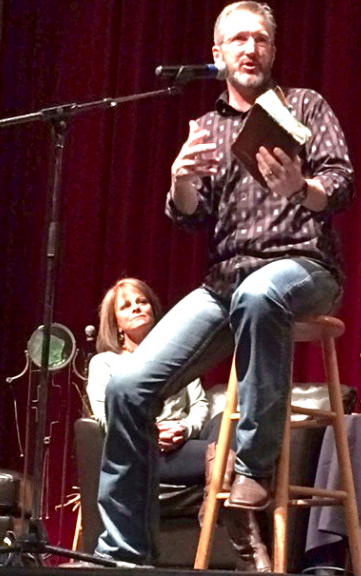
I went a pretty traditional route with the marriage, and making babies, and buying a house, and working at a job that would make enough money—even though it might not be a job I liked—to make enough money so I could do those things.
There was a point, because of this youth pastor’s work in my life, that I decided to try to reconcile with Dad. And the only way I knew how to do that was to confess my stuff.
Dad retired early, so [my parents] decided to move into our hometown. And I can remember one time holding a flashlight for Dad, doing a project [with him] and not being able to hold the flashlight just right. I was kind of trying to get it down in there with that particularly hard nut in the alternator, or wherever it was. [Dad snapped] at me, and it took me right back to six years old when I couldn’t hold the flashlight right. It took me back to [me thinking], I am not going to be a man like you think a man should be. Which, by the way, I think that was my dad’s agenda was for me: be a man.
I felt again, at 24 years old, You’re not going to be a man. You can’t even hold the flashlight right. You’re not even doing the mechanics.
I went into a funk for a couple months and I said, I’m not doing this again. I’ve got to talk to Dad.
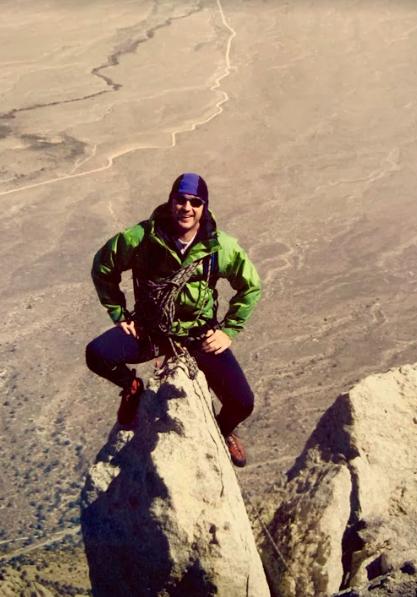
So we took a hunting trip. We leave Mt. Vernon, Washington, head up for the three-hour drive over the Northcross Highway. We get to Washington Pass, and the moment we’d left, I had determined, This is the weekend. This is the weekend.
But [at this point], two hours of this trip have been miserable, me sitting there knowing I’m going to face my dad and have a showdown again, if you will. Then I [felt] like the spirit of God just touched me.
I pulled over to the side of the road, put my hand on Dad’s hand and said, “Dad, we’ve got to talk. I’ve got to tell you something.” He was not expecting that. And I told him, “Dad, I’ve held a grudge against you for 10 years. And you’ve probably known that I’ve avoided you, but I get it now that I [have my own family]. You were working so you couldn’t be there. And when you came home on the weekends, you wanted to cram a week of parenting into two days, or maybe just a moment out in the shop. But the effect that had on me, Dad, was, ‘Hey, where were you on Tuesday when I needed you?’ You weren’t there, and then you come home and want to be Super Dad? It didn’t work. Dad, I forgive you for that. I don’t know how else to do this, but can we talk about that?”
And by this time, his hand is on top of mine. And mind you, I’m full grown at this point. His hand was still bigger than mine, and this was the hand that put its arm on me in church. I knew that hand as comfort, but it was also the hand that beat the hell out of me. I knew it as pain. He put his hand on top of mine and said, “I’m so sorry. I am really sorry.”
And it was gone. Most things in life aren’t gone like that. But [my resentment] was gone.
Had he said, “Hey, wait just a minute. That’s not the way it went down,” or, “Hey, I’ll bet you know how that feels now that you’ve got your own [family].” Had he even tried to defend himself, I would have gone into a hole again for another ten years.
He said, “I’m sorry.”
And I will tell you that after that, we were best buddies, as much as a 24-year-old and a 62-year-old can be best buddies. We did a lot of stuff together. I think Dad respected what I was doing in my career, and in my family. We cleared the air, and I think it was man to man.
I so wanted that affirmation from Dad, and so wanted to be affirmed from him and by him on his terms. I didn’t want him to say, “You’re a good boy,” because I know those weren’t his terms, and I knew the Bible school wasn’t his terms. Changing a flat on the side of the road in a snowstorm—those were dad’s terms.
What a gift he gave me by stepping off of his platform, [being] willing to change and adjust our relationship. Those things really catapulted our relationship.
“What a gift [my dad] gave me by stepping off his platform and being willing to change and adjust our relationship.” – Mark Eaton
I was with Dad as he died, and some of his last words were, “I know what you’ve done. I know where you’re at in your life. You’re way ahead of where I was at that point in my life. I’m proud of you.”
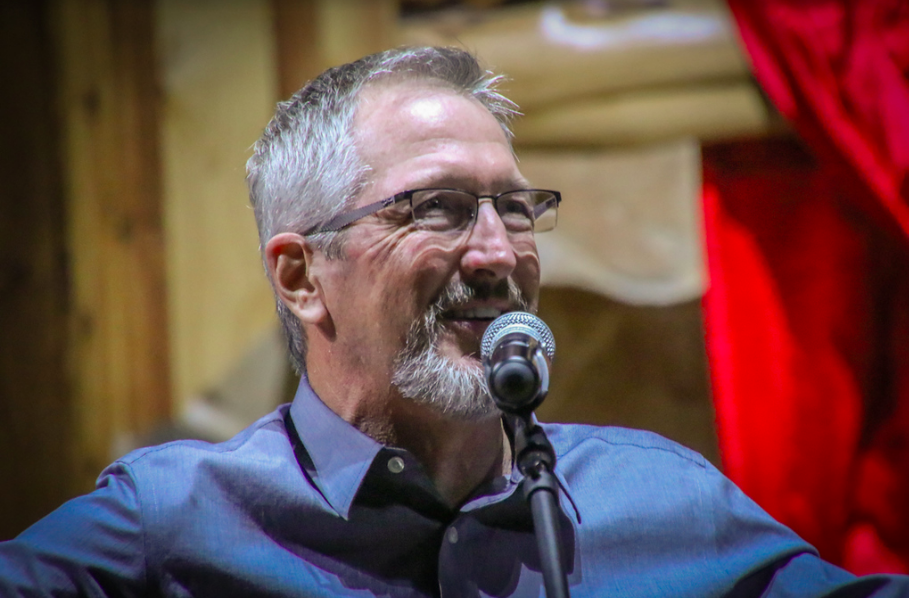
Narrator: Although Mark’s relationship with his father was difficult, and getting to the point of letting God restore their bond was no easy task, in the end, they reaped the rewards of reconciliation. Mark wraps up his time with us by reflecting on what it means to face adversity, and includes a passage of Jesus Calling as an encouragement to all of us in facing tough times.
Mark: Those who expect life to be easy will have a terrible time. Sarah writes here, “Expect to encounter adversity in your life, remembering that you live in a deeply fallen world.” That is such an important perspective. Our day is not going to go the way we want it to. We have this idea [that says], “I was a good day, or it was a bad day.” But to me, every day is not divided up into good and bad, but easy and hard. And there are certain times when it is just hard. But none of it’s good or bad, because what’s a bad thing one day might be the thing that saves you the next.
“To me, every day is not divided up into good and bad, but easy and hard . . . because what’s a bad thing one day might be the thing that saves you the next.” – Mark Eaton
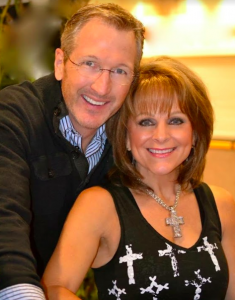
Life is really tough, and adversity comes every single day. And it should come every single day. I would hate to know myself, or to hang out with people who had never had adversity. I wouldn’t want to be around them. I want to be around people who have scars, who are willing to talk about them and aren’t afraid to show them.
And I love the stories. Every scar has a story, and I want to know the story.
“I want to be around people who have scars, who are willing to talk about them and aren’t afraid to show them.” – Mark Eaton
Narrator: To find out more about Mark Eaton’s ministry or to see he and his wife Susie in concert at a venue near you, please visit EatonLeadership.org.
Narrator: Stay tuned for our next interview with country music singer/songwriter Kelsey Lamb after a brief message about a free offer from Jesus Calling!
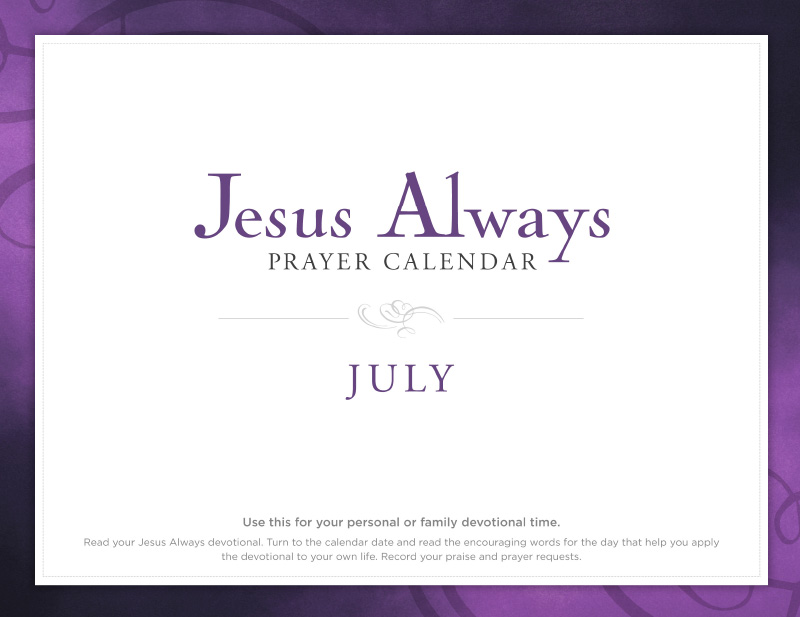 Are you looking for a way to keep track of your daily prayers along with Jesus Calling? The Jesus Always family prayer calendar goes right along with your daily readings from Jesus Always. Each day begins with a guided reflection, followed by a space for you to fill in your prayers of thanksgiving and special requests. You can get your free Jesus Always Family Prayer calendar by visiting JesusCalling.com/offer
Are you looking for a way to keep track of your daily prayers along with Jesus Calling? The Jesus Always family prayer calendar goes right along with your daily readings from Jesus Always. Each day begins with a guided reflection, followed by a space for you to fill in your prayers of thanksgiving and special requests. You can get your free Jesus Always Family Prayer calendar by visiting JesusCalling.com/offer
Narrator: As a little girl, country music singer/songwriter Kelsey Lamb learned the powerful ways that music can help us express our emotions, especially when they feel overwhelming to us. To pay it forward, Kelsey’s mission with her music is to be a voice for young girls trying to figure out who they are and where they’re going. Kelsey recently moved to Nashville and released her first single called “Little by Little.” She’s navigated big changes in her life and career, Kelsey can see God walking beside her through it all.
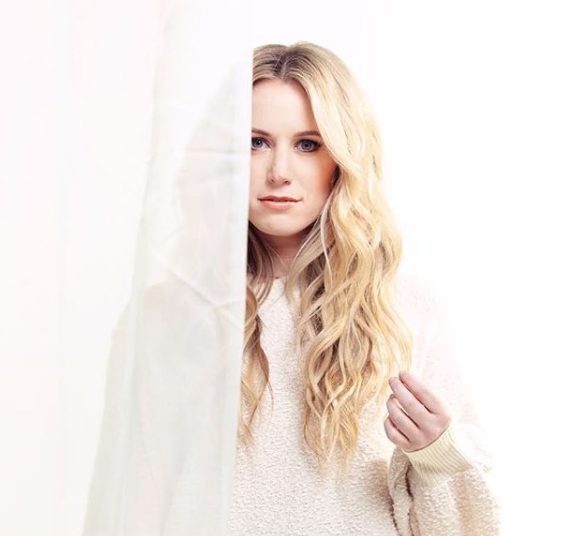
Kelsey Lamb: My name is Kelsey Lamb. I’m originally from Little Rock, Arkansas, born and raised. I moved to Nashville about two years ago to pursue music.
I grew up in a musical family. None of us really play instruments, but we all can sing. We grew up harmonizing and singing in church together in the choir, singing solos. My sister and I did talent shows together. We sang “My Heart Will Go On,” and it was cute.
[When I was about 16], my parents gave me [a trip to Nashville] as a birthday present. I came here and recorded a few songs. Still, you don’t really know what it means to come and [be in the music business as a songwriter]. I didn’t write any of them. I just came and recorded some songs.
I was probably 17 when I realized, This is it. I really want to pursue a career out of this. [I don’t want it to be] just a hobby.
Music as a Mission
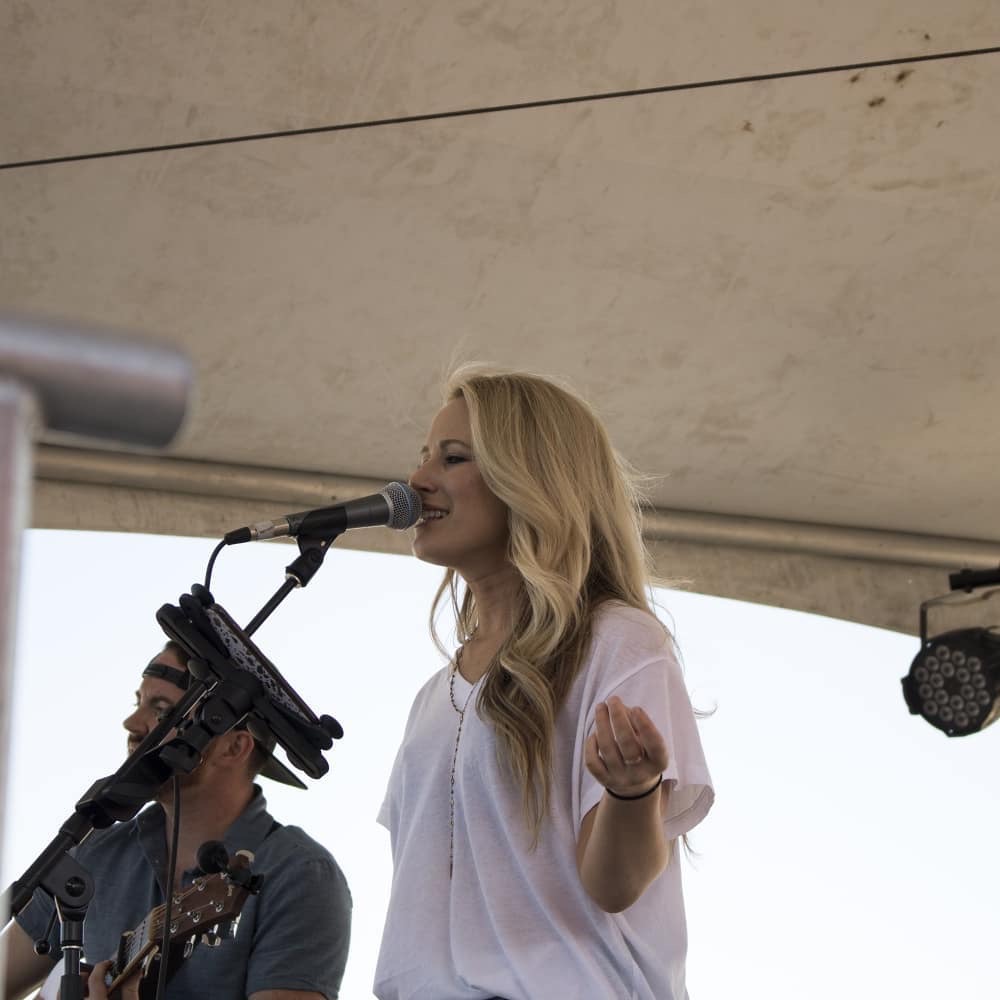
I think my biggest transition into knowing that I wanted to be a part of the songwriting and tell my story through my music: I worked at a summer camp in California called Pali Overnight Adventures. I think that’s the name of it still—Pali Adventures, maybe. It’s a unique camp. You go and you have a specialty that you do, and I was in rockstar camp. You basically write songs, and you record a song, and you do music videos, and you perform at the end of the week.
I went [back to Pali] as a counselor one year, and I wrote a song with this little boy who was really homesick. We just kind of hashed it out in a song. He was really thankful, and we performed it. He learned how to play guitar for the first time, and we performed it on stage together.
I was like, That’s cool. I want to do this. I want my music to touch people the way that it touched him when we wrote together.
My purpose through my music, it’s always been a mission for me. [I want] to just help people get through situations. [Music] just helps people get through things. It celebrates with people.
Almost all of my songs come from personal experiences: my break ups, moving to Nashville, college. All of that is in my music, hoping to help someone else get through it.
This is really funny, but I grew up listening to Avril Lavigne. She really connected with me and listening to her music got me through a lot of heartbreak, and then it also made me sassy. It just kind of resonated with my personality a lot.
“Almost all of my songs come from personal experiences: my break ups, moving to Nashville, college. All of that is in my music, hoping to help someone else get through it.” – Kelsey Lamb
I think that a lot of young girls are kind of afraid to let their personality shine because they’re afraid that they’ll be judged, or they’re afraid that being sad is bad, to go through heartbreak openly. I think that music helped me get through that without having to show the world, “Hey, I’m sad.” I could just [work through my feelings in] my room or my car with music. That’s what I hope that my music is, especially for young girls. [I want them] to feel like they have a friend in my music.
God Helps Us Get to the Next Step
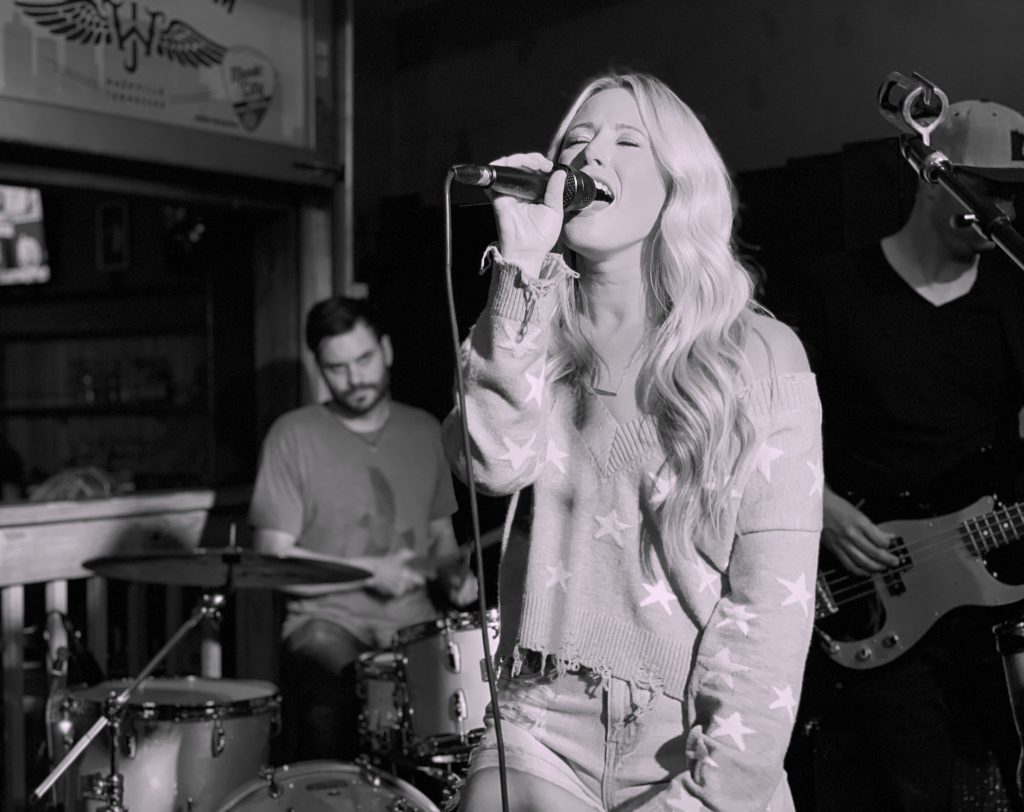
When I’m writing a song, the easiest part about writing is the titles for me. So I usually come into a writing session with a list of titles and storylines. I like to touch on things that are personal to me when I’m writing for a project.
“Little by Little” was written with two guys here in Nashville, Erik DiNardo and Jessie LaBelle. And it was kind of a weird writing process. I brought the title in to Erik DiNardo, and [writing with a new songwriter is] kind of like a first date, so the first writing sessions was super awkward. We got the first chorus written, and then we brought that concept to Jesse LaBelle, who helped us bring the song to life and make a cuter storyline out of it.
For me, taking life little by little, in a sense [means recentering myself]. I do pilates every day, and that’s kind of how I recenter myself, for the most part. I like to be alone with myself and to get away from the chaos, which helps me push to the next day.
I do a devotional every single morning. I didn’t for a while, but I’ve come back to Jesus Calling, actually. When you jump back into devotionals, you start to realize that every devotion ends up being completely applied to what you’re going through. It’s so weird. I’ve started to notice that I’ll read a devotion [when] I’m really stressed out, and the devotion is talking about stress or moving forward or overcoming it. And so that’s kind of how I try to stay on my path.
“When you jump back into [Jesus Calling,] you start to realize that every devotion ends up being completely applied to what you’re going through.” – Kelsey Lamb
I’m going to read a passage from Jesus Calling, the January 5th passage:
You can achieve the victorious life through living in deep dependence on Me. People usually associate victory with success: not falling or stumbling, not making mistakes. But those who are successful in their own strength tend to go their own way, forgetting about Me. it is through problems and failure, weakness and neediness, that you learn to rely on Me.
True dependence is not simply asking Me to bless what you have decided to do. It is coming to Me with an open mind and heart, inviting Me to plant My desires within you. I may infuse within you a dream that seems far beyond your reach. You know that in yourself you cannot achieve such a goal. Thus begins your journey of profound reliance on Me. It is a faith-walk, taken one step at a time, leaning on Me as much as you need. This is not a path of continual success but of multiple failures. However, each failure is followed by a growth spurt, nourished by increased reliance on Me. Enjoy the blessedness of a victorious life through deepening your dependence on Me.
God has definitely played a huge part in this.
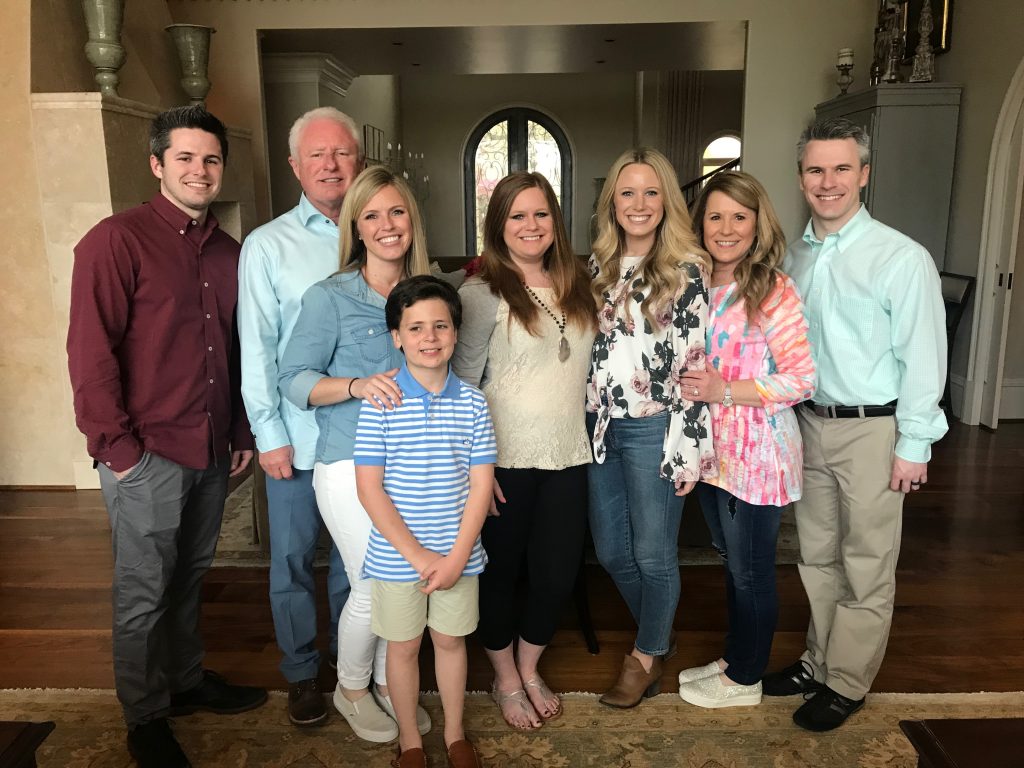
I went to college before I moved to Nashville. My parents encouraged me to get a degree because you never know if music is going to work out, unfortunately. It’s kind of a hit-or-miss, one-in-a-million kind of situation. But once I graduated college, I stayed at home for about a year and a half, and I just knew I suppose to go to Nashville. You just feel it when you’re not on the right path, and you feel like there’s just something you gotta do to make yourself just feel at home, complete, like you’re going the right direction.

I definitely feel like God has kind of pulled me along the way, and He keeps opening doors that I’m like, How the heck did that happen? [He doesn’t] necessarily give me things, but He’s helping me get to the next step as I work towards it. And I don’t think that it will ever just be handed to me. I think that He puts opportunities in my path to help me work to get to the next step. So He’s definitely got a huge hand in all of this, and I feel it every day.
“I don’t think [my career] will ever just be handed to me. I think [God] puts opportunities in my path to help me work to get to the next step.” – Kelsey Lamb
Narrator: To get the latest on Kelsey’s music, please visit kelseylamb.com.
Narrator: If you’d like to hear more stories about people working through their heartbreaks and scars to help others, check out our interview with former WWE wrestlers Ted DiBiase and Marc Mero.
Narrator: Next time on the Jesus Calling Podcast, we speak with world champion steer roper Tyson Durfey and his wife, country singer Shea Fisher. Tyson had long strived to win a National Rodeo Finals championship. As he approached the end of a difficult year of competition, it looked like his efforts would end up in disappointment—until he heard a word from God that gave him peace.
Tyson Durfey: Everything that happens happens for a reason. And sometimes you have to be put through the fire to be refined.
In the 7th go-round of the National Finals, I’m in the shower, got done and out of the shower, put the towel over my face, and the Lord just spoke to me immediately. He said, “I’m with you.” I’m getting goosebumps right now talking about. I just wanted to fall down on my knees and cry cause I was shook by it.
From that moment, coming out of the shower, I knew I was going to be the world champion.

